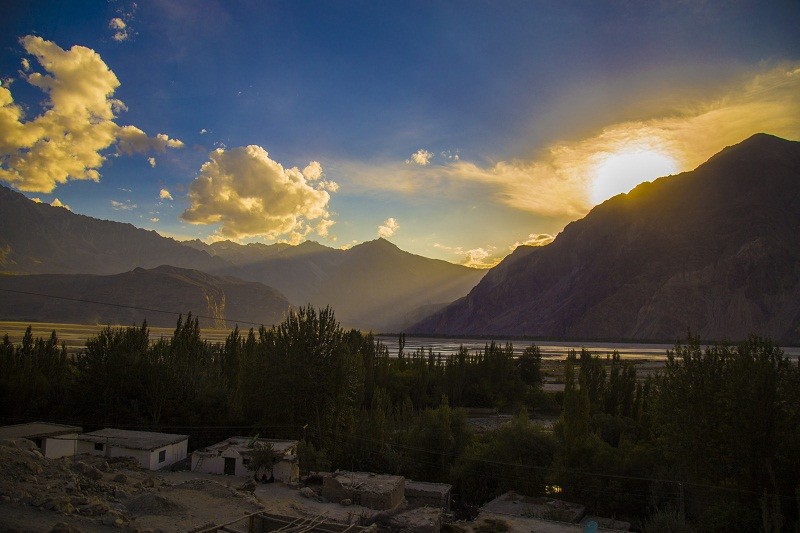
Beyond the Babusar Pass in Gilgit Baltistan, it’s another world!

Imagine: you’re crossing the Babusar Pass, the newly built road, paved and smooth compared to the Karakoram Highway, negotiating rivers, lakes, glaciers, mountain ranges, snow-capped peaks, plains — and deserts too… the beauty around is breathtaking.
This road that connects Khyber Pakhtunkhwa (KP) with Gilgit Baltistan (GB) has been a game-changer, as it has opened the area to more than one million local and foreign adventurists a year.
For the sake of clarity, GB can be divided into Gilgit and Baltistan. Most local tourists come to Gilgit by road and not all of them travel further east into Baltistan. They make a stopover in Gilgit, visit adjoining valleys, spend time in touristy Hunza and travel up north to Khunjrab Pass, on to the Pakistan-China border.
Only true adventurists embark on the journey to Baltistan — that comprises four districts, Skardu, Ghanche, Shigar and Kharmang. It takes six hours to reach Skradu from Gilgit if the road is cleared up after landslides. Due to its tough terrain, extreme weather conditions, remoteness and its proximity with the Line of Control (LOC), this area is less travelled and remote. For example, Ghanche district borders India Held Kashmir (IHK), and Shyok River flows through Ladakh and then Ghanche. Siachen Glacier and Kargil are also not very far away.
Due to its strategic significance and limited accessibility, NGOs and other development sector organisations find it hard to leave footprint in Ghanche Valley, whereas the active intervention of the Aga Khan Foundation has transformed Hunza Valley. Tourists throng to Aliabad and Karimabad in Hunza every year.
This realisation has made the government of GB take steps to attract more local tourists to Baltistan. The recent Cold Desert Jeep Rally in Sarfa Ranga Village, participated by 200 drivers from all over the country and abroad, was one such effort.
Foreign tourists visit GB to trek and climb mountains that are among the highest in the world. But their number is not significant enough to bring change and support the local people. The trickle of tourists from within Pakistan though is making a slight difference. Skardu, for instance, thrives on tourist activities and several training centres have opened up to cater to their needs.
During my recent trip to Skardu and Ghanche districts, I met visitors who had either travelled by road after bypassing Hunza or flown in directly from Islamabad and were uncertain how they’d get back, as flight schedules are subject to unpredictable weather and since pilots have to depend on manual systems, they are advised not to take risks while flying.
Zahid Amir, a visitor, thinks the Rs 30,200 fare for the 40-minute flight from Islamabad to Skardu is steep and discourages people from travelling in this direction. "The authorities should install automatic landing system at the Skardu Airport to ease the flight frequencies and schedule," he says. "When people are unsure about flights they remain hesitant to travel."
This uncertainty has helped a market of perishable commodities like peaches and apples flourish just outside the airport in Skardu, as passengers waiting to fly out of Skardu prefer to buy them once the plane from Islamabad has landed because they are sure the same plane will fly back after an hour. Otherwise, the perishable items would go waste. A little farther from the airport, Naya Bazar, Purana Bazar, Alamdar Chowk, Kazmi Bazar Yadgar Chowk are ideal places to shop for dried apricots, walnuts and even traditional Balti clothes.
Salajit, a semi-solid sticky substance that oozes out from cracks in high mountains, is a specialty of this area. A large number of shops in Skardu claim to sell pure salajit that, they claim, carries scores of mineral ingredients. If you go by their claim, it can cure almost every disease, including diabetes, arthritis, hypertension, abdominal pains, impotency and what not.
Gilgit-Baltistan experienced a slump in tourism after the June 22, 2013 massacre at the base camp of Nanga Parbat, when militants killed 10 foreign mountain climbers and a local cook. "We suffered a lot, even though Nanga Parbat is situated far away," says Muhammad Ali, a resident of Skardu.
But in recent years, the situation has improved and tourists are pouring in. The government is providing support by granting special permission to tourists to trek in otherwise restricted areas. Fishing for trout in natural lakes is another added attraction for tourists.